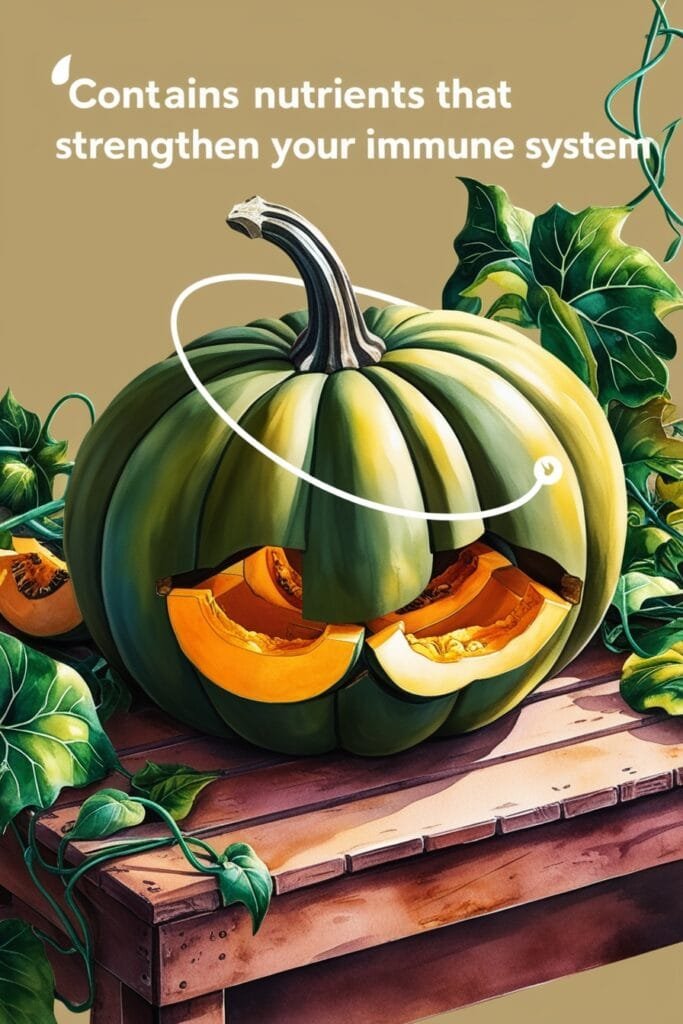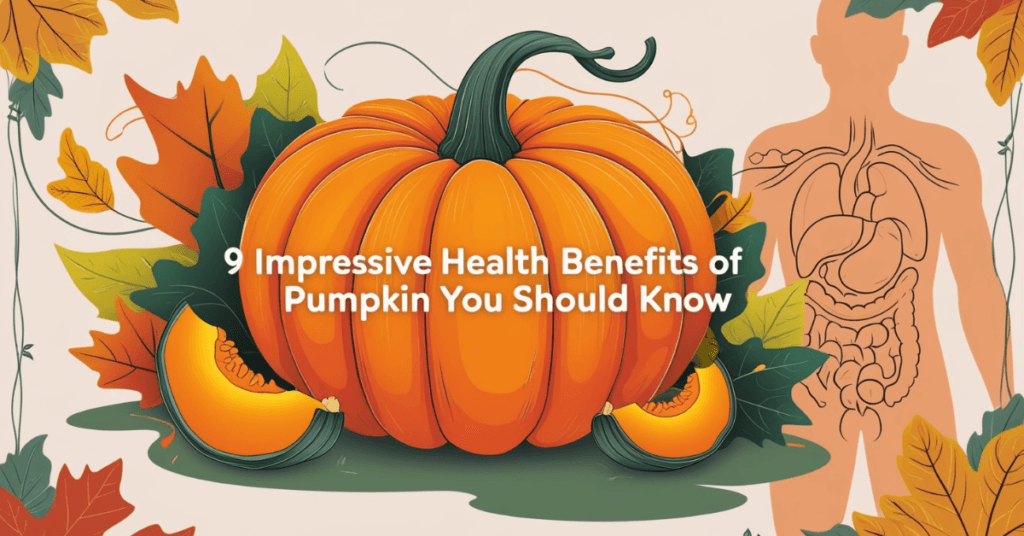Pumpkin — pound-for-pound, one of the best foods for you ever: nutrient density and taste often make it a winner (especially during Thanksgivingtime and Halloween). This healthy squash, which belongs to the gourd family Cucurbitaceae along with many other squashes like pumpkins and zucchini types originated in North America. The term “pumpkin” is also used when translating American books or films, which refers to similar types of winter squash in other countries where the name had been made up.
But pumpkin isn’t just fun to carve for Halloween or to bake into pies. It’s incredibly nutritious and offers some amazing health benefits. Although it is botanically a fruit (it contains seeds), it is also rich in nutrients usually associated with vegetables, so it’s a welcome addition to a healthy diet. Let’s look at nine reasons you should consider adding more pumpkins to your meals!
1. Highly Nutritious and Packed with Vitamin A
Pumpkin is a nutritional powerhouse, packed with vitamin A, an essential nutrient for a host of bodily functions. In a single serving (245 grams) of cooked pumpkin, you receive:
- Calories: 49
- Fat: 0.2 grams
- Protein: 2 grams
- Carbs: 12 grams
- Fiber: 3 grams
- Vitamin A: 245% of the daily recommended intake (RDI)
- Vitamin C: 19% of the RDI
- Potassium: 16% of the RDI
- Copper, Manganese, Vitamin B2, and Vitamin E: Around 10% each

This, along with the fact that pumpkin is low in calories and high in water (94 percent of It is water), stays full without getting a lot of calories. Another thing in abundance is beta-carotene, an antioxidant that gives it that orange hue and that your body turns into vitamin A – vital for eye health, immune function, and other things. Its seeds are edible too, and nutritious, carrying a healthy dose of fats.
Summary: Pumpkin is one of the healthiest foods around because it is very nutrient-rich, especially in vitamin A, yet very low in calories.
2. High in Antioxidants That May Lower Your Risk of Chronic Diseases.
Free radicals are a normal byproduct of everyday bodily functions, such as digesting food and eliminating waste. Sometimes, however, these free radicals can damage cells, and the cumulative effect of such damage has been associated with diseases such as heart disease and cancer. Here, It does the trick, for it is rich in antioxidants including alpha-carotene, beta-carotene, and beta-cryptoxanthin. These antioxidants stabilize the free radicals, preventing them from damaging your body’s cells.
Animal and laboratory work indicates that these antioxidants may shield skin from sun damage, reduce the chances of some cancers, and even guard against eye diseases. While more research on humans is needed, the evidence so far looks promising.
Summary: Its antioxidant power may also help to protect your cells against damage from free radicals, which may help to prevent chronic disease.
3. Contains Nutrients That Strengthen Your Immune System
It’s your immune system’s job to fight viruses, bacteria, and other harmful agents day in and day out. Pumpkin, with this mucking great dose of nutrients, can aid your immune system as well. For one thing, it’s rich in vitamin A, which strengthens your body’s resistance. Studies show that people with low vitamin A levels often have weaker immune systems, which means they’re more likely to get sick.
It is also a good source of vitamin C, which enables your body to produce more white blood cells ᅳ the cells that combat infection. Vitamin C also makes these immune cells work more efficiently and allows wounds to heal quickly. Vitamin E, iron, and folate – other immune-supporting nutrients found in pumpkin – all contribute to maintaining your body’s immune defense.

Summary: Pumpkin’s high levels of vitamins A and C, as well as iron, folate, and vitamin E, make it a great food for boosting immunity.
4. Good for Eye Health: Vitamin A, Lutein, and Zeaxanthin
It’s normal for eyesight to weaken as you age, but eating the right nutrients can help protect your vision. Pumpkin is rich in beta-carotene, which your body turns into vitamin A. It is a vital vitamin for the eyes and prevents night blindness. Indeed, vitamin A deficiency is a leading cause of blindness globally.
One large study of over 20 studies found that people who consume more beta-carotene have a significantly lower risk of cataracts. It is also one of the top food sources of lutein and zeaxanthin, two antioxidants that guard your eyes against age-related macular degeneration (AMD) and cataracts, which are two of the most prevalent causes of vision loss in older adults.
What’s more, the vitamins C and E in pumpkin are antioxidants that help to shield your eye cells from damage by free radicals, keeping your eyes in good shape as you grow older.
Summary: Its beta-carotene, lutein, and zeaxanthin help maintain good vision and protect against cataracts and macular degeneration, two of the most common age-related eye problems.
5. Nutrient Density and Low-Calorie Count Support Weight Loss
Trying to lose weight? It can be a fantastic food for your diet! It’s low in calories—less than 50 calories per cup—but it’s packed with nutrients and fiber. It is so rich in water, that it’s satiating, so you can eat a lot of it without ingesting too many calories.
Pumpkin also keeps you satiated because of its fiber content, which can suppress your appetite and prevent you from wanting to snack. Fiber slows digestion and stabilizes blood sugar, so you’re less likely to experience energy crashes that can lead to overeating.
Summary: Pumpkin is low in calories and high in fiber, making it a great food for weight management. It will fill you up and not put you in many calories.
6. Pumpkin’s Carotenoids Could Reduce Your Cancer Risk.
Cancer is a cancer, a disease in which cells proliferate out of control. Studies show that certain antioxidants, like carotenoids, can reduce the risk of some types of cancer by fighting the damage caused by free radicals. Carotenoids are pigments in plants that act as antioxidants, and pumpkin is a good source of them, such as alpha-carotene and beta-carotene.
In a comprehensive review of 13 studies, researchers determined that those who consumed greater amounts of these carotenoids had a reduced risk of cancer, especially stomach, throat, pancreatic, and breast cancer. Half suspect that it’s the carotenoids that lower cancer risk, the other that it’s just a healthy diet in general. Either way, piling up on carotenoid-rich foods such as pumpkin is a good idea.
Summary: Pumpkin carotenoids, including alpha-carotene and beta-carotene, can have cancer-protective effects, including stomach and breast cancers.
7. Promotes Heart Health with Potassium, Vitamin C, and Fiber
Your heart beats constantly, day after day, and the nutrients in pumpkin can help your heart stay healthy. It contains potassium, which some studies have linked with decreasing blood pressure and stroke risk. Both hypertension and strokes are leading causes of heart disease, so maintaining these two elements in check will ensure that your heart is healthy.
It is also rich in vitamin C, which supports blood vessel health and reduces the damage caused by free radicals. The pumpkin’s fiber also helps lower cholesterol by absorbing cholesterol particles in your gut and excreting them from your body. And, of course, pumpkin’s antioxidants help to protect cardiovascular health by inhibiting the oxidation of LDL cholesterol (aka ‘bad cholesterol’, which can create plaques in your arteries.
Summary: Full of potassium, vitamin C, fiber, and antioxidants, pumpkin promotes cardiovascular health, reducing the risk of hypertension, stroke, and other cardiac problems.
8. Beta-carotene, vitamin C, vitamin E Skin Health.
It is full of nutrients that can benefit your skin, helping to keep it youthful and protected. Pumpkin’s beta-carotene works as a sort of natural sunscreen once it makes it to your skin. It protects skin from damaging UV rays, so it’s like swallowing your suncream.
Vitamin C in It is another good nutrient for the skin because it helps collagen production. Collagen is a protein that maintains strength, smoothness, and elasticity in your skin. Vitamin E also plays a role as an antioxidant, shielding skin cells from damage. Additionally, pumpkin contains lutein and zeaxanthin, which are linked to reduced risk of skin damage due to sun exposure.
Summary: Its beta-carotene, vitamins C and E, lutein and zeaxanthin protect your skin from UV damage and maintain its strength and health.
9. Versatile and Easy to Add to Your Diet
One of the best things about It is how versatile it is. Its subtle sweetness lends itself to both desserts and savory dishes, from pumpkin pies and pancakes to soups and roasted vegetables. When preparing fresh pumpkin, remember that it has a thick, hard skin that can be tough to cut through. However, when you slice it open, you can roast the sections, or scoop out the soft flesh for purées.
Don’t forget about the seeds! Pumpkin seeds are also nutritious, containing fiber, magnesium, and fats. Roasted pumpkin seeds make a great snack that can support bladder and heart health. Pre-cut or canned pumpkin can be a great alternative if you don’t have time to cut and cook a whole pumpkin. Just be sure to read the label to avoid products with added sugar.
Summary: Pumpkin is tasty, a good thing, and simple to include in sweet and savory dishes. Its seeds are also edible and nutritious.
Who Should Be Cautious About Pumpkin?
It is good for most people, but some should tread lightly. Some people may be allergic to pumpkins, so if you notice an allergic reaction, it’s best to avoid it. It is also mildly diuretic, which means it can increase urine production, similar to a “water pill” effect. That can be a problem for those taking some medications, such as lithium since diuretics can alter the way these drugs are metabolized in the body.
Last, keep in mind that pumpkin-flavored processed foods – such as pumpkin spice lattes and sugary pumpkin pies – cannot live up to the nutritional value of a whole or fresh pumpkin. Those goodies tend to be packed with sugar, which can cause weight gain and other problems.
Summary: Pumpkin is by and large safe to eat, but you should consult your physician before consuming large quantities of it, especially if you have allergies or certain medications.
The Bottom Line
Pumpkin is a tasty, nutritious food that benefits you in so many ways. It’s low in calories but rich in vitamins, minerals, antioxidants, and fiber, making it ideal for anyone looking to improve their diet. Among its virtues are immune system enhancement, eye protection, heart health, and youthful, healthy skin. The possibilities are endless, from pumpkin desserts to pumpkin soups, and you can reap all the health benefits from this versatile fruit.
So, the next time pumpkin season comes around, remember it’s more than just a Halloween decoration or pie filling—it’s a fantastic addition to a balanced, nutritious diet! Start sprinkling pumpkin into your diet and reap its amazing health benefits today.




